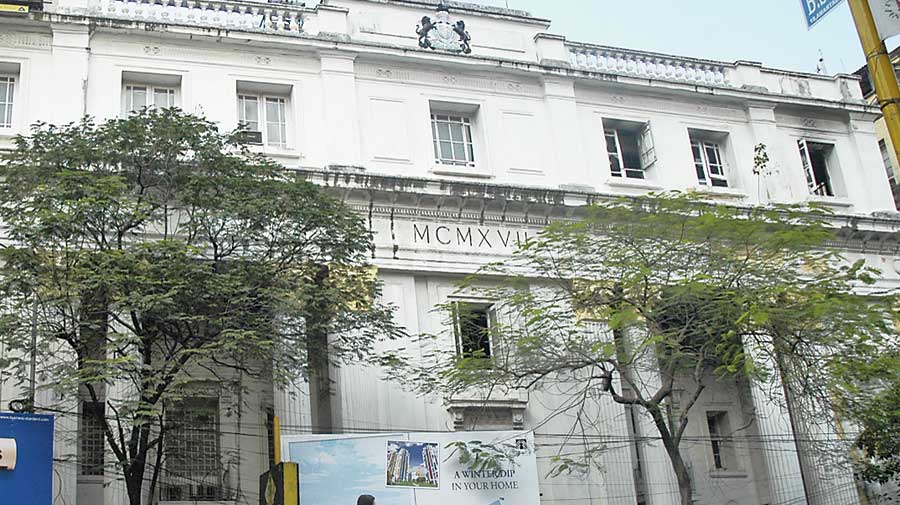Bengal Chamber of Commerce & Industry (BCC&I) has put an end to the three-and-half decade long tax dispute with Calcutta Municipal Corporation, clearing the air of uncertainty over the oldest business chamber in the country.
BCC&I, which is owner of the iconic Royal Exchange building at Dalhousie, dipped into its internal reserves and arranged special funding from external sources to pay off Rs 9.61 crore in municipal taxes.
The chamber took advantage of the waiver scheme announced by the Bengal government to clear the dues. Under the scheme, a taxpayer could get a 100 per cent waiver on penalty and interest, leaving them with the option to pay only the outstanding principal amount. The scheme was operational till March 31.
BCC&I owed Rs 30 crore to CMC in unpaid taxes, including penalty and interest. Last year, Calcutta High Court had rejected the chamber’s plea seeking relief from the payment of municipal taxes.
The chamber, formed in 1853, had contested CMC’s tax claim on the property which was built in 1919 on the same premises where Lord Richard Clive, the first governor general of India, used to live.
CMC and the chamber have been sparring on municipal tax claims since 1987. The property, a fine illustration of the ionic order of Grecian architecture with long columns holding the roof, was declared a heritage property in 2004.
“The Bengal Chamber has resolved its property taxation matter with CMC in respect of its heritage Royal Exchange premises. The matter remained unresolved for over 30 years and despite possessing requisite tax clearances from CMC, the issue had sustained for decades,” said Deb A. Mukherjee, president of BCC&I.
BCC&I is a not-for-profit organisation which earns revenue from membership fees, seminars, workshops and meetings, sponsorships and consultancy services. It also earns rent by letting out a part of the property. Apart from two banks on the ground floor, the tenants include the eastern region office of CII, Indian Tea Association and Indian Jute Mills Association.
Even though BCC&I had managed the last fiscal well by cutting down cost, given the pandemic dried out a lucrative revenue stream of physical meetings, paying off CMC came at an ‘immense cost,’ it said.
“The chamber has arranged for special funding and settled the entire property tax burden with the support of and in continuous dialogue with CMC while looking forward to working together with CMC in maintaining preserving and developing its own heritage property and that of the city in the evolving urban sustainability sphere,” Mukherjee added.
The dispute
CMC, under the mayorship of Trinamul Congress leader Subrata Mukherjee, accorded heritage status to the building, which has about 50,000 square foot built up space, on June 2, 2004. Thereafter, the corporation and the chamber decided to enter into an understanding to promote and develop Calcutta and Bengal.
A letter dated May 6, 2005 from the municipal commissioner stated that in view of the public-private partnership arrangement between the chamber and corporation, BCC&I would be exempted from paying municipal tax.
A further communication from the commissioner on the same day noted a draft PPP agreement has been approved. The MoU was later signed by the chamber and sent to the corporation where it remained. Calcutta High Court held that there was no final agreement which the petitioner can enforce in a court of law.
Under Section 425K of the Calcutta Municipal Corporation Act, CMC can exempt the owner of a heritage property from payment of tax or fees. However, a specific agreement must be forged for that.
Now that the tax dispute is behind it, the chamber may make a fresh attempt to get tax exemption. BCC&I spends close to Rs 90 lakh a year to maintain the property. While a decision is likely to be taken up when a new board is in place after the municipal election, the chamber may also seek a relook at the valuation of the property, which it believes is significantly less that what has been ascribed now by the civic authority.
Glorious past
Apart from Lord Clive, the other notable resident on the premise was Philip Francis, who fought the famous duel with Warren Hastings. Oriental Bank Corporation bought the premise in 1842 and occupied it till 1893.
BCC&I bought the premise from the bank, pulled down the building later and constructed the premise as seen today. Formed in 1833 by 25 merchants, the Chamber by then required a much bigger space for sprawling activities and a large number of members.
The Chamber commented and provided input on several legislations of pre-independent India, including Indian Electricity Bill, 1902, Life Assurance Legislation, 1910, Customs Act among many others.










